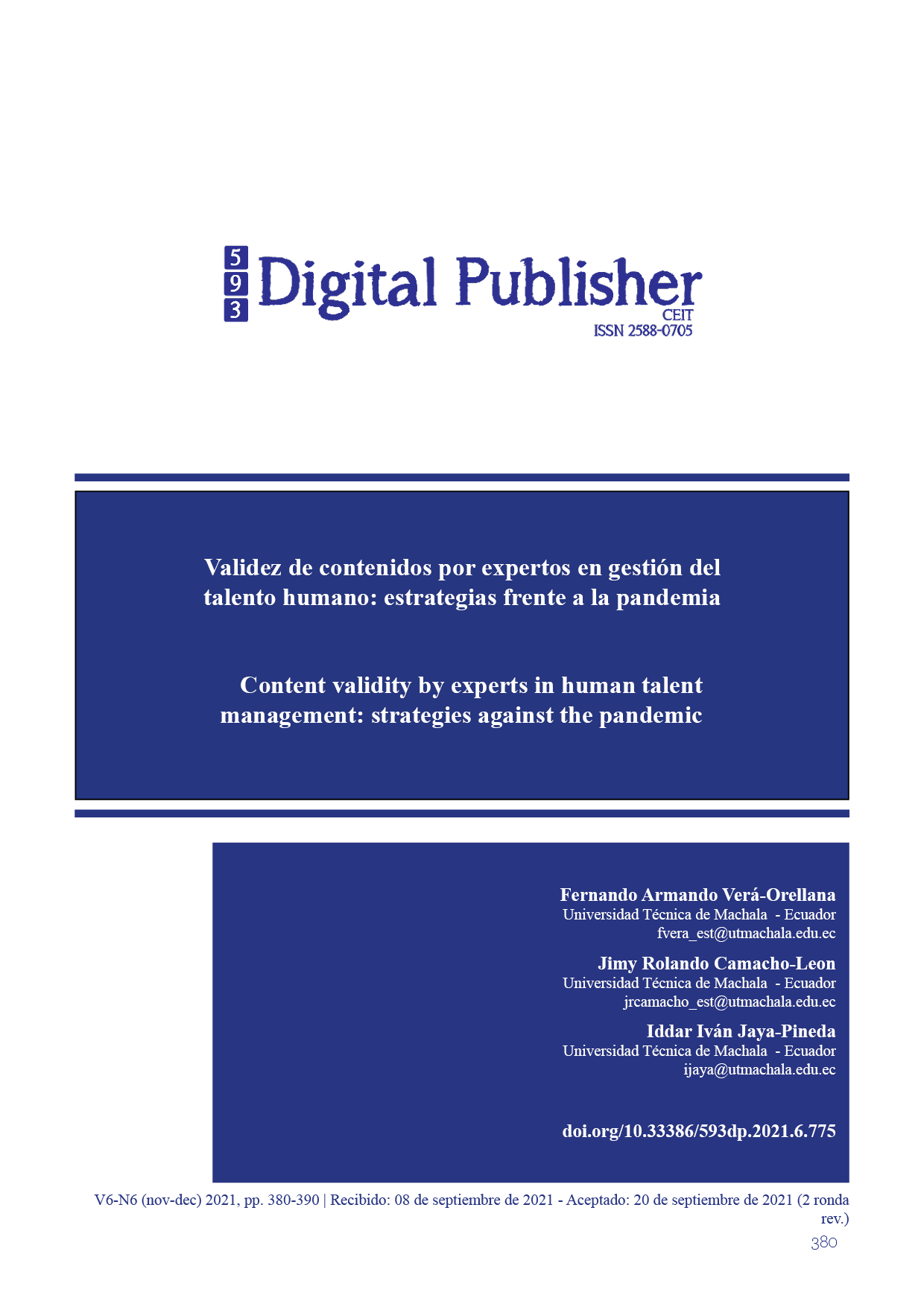Content validity by experts in human talent management: Strategies against the pandemic
Main Article Content
Abstract
The repercussions of COVID-19 on companies go beyond the economic and financial aspects, since human talent is also one of the elements most affected. This article analyzes the way in which the pandemic has affected the management of human talent and investigates the acts carried out by third parties in order to minimize their impact. On the other hand, in the Machala canton the company Distribuidora Ortega with more than twenty-five years dedicated to the commercialization of agricultural and aquaculture inputs in the province of El Oro has presented complications since March 2020 when the confinement measures and other restrictions were decreed, For which the objective was to reduce the impact of COVID-19 on the development of business activities where human talent intervenes. The proposal of this research has been an instrument which was initially designed with thirteen strategies focused on improving the management of human talent according to the framework of the pandemic, to which the Lawshe Content Validity Ratio was applied and the adjustment de Tristán, obtaining as final input an instrument with nine strategies that scored a Content Validity Index of 0.819. The group of specialists who evaluated the strategies were eight people with third level degrees or higher and with three or more years of experience managing work groups of more than twelve collaborators.
Downloads
Article Details

This work is licensed under a Creative Commons Attribution-NonCommercial-ShareAlike 4.0 International License.
1. Derechos de autor
Las obras que se publican en 593 Digital Publisher CEIT están sujetas a los siguientes términos:
1.1. 593 Digital Publisher CEIT, conserva los derechos patrimoniales (copyright) de las obras publicadas, favorece y permite la reutilización de las mismas bajo la licencia Licencia Creative Commons 4.0 de Reconocimiento-NoComercial-CompartirIgual 4.0, por lo cual se pueden copiar, usar, difundir, transmitir y exponer públicamente, siempre que:
1.1.a. Se cite la autoría y fuente original de su publicación (revista, editorial, URL).
1.1.b. No se usen para fines comerciales u onerosos.
1.1.c. Se mencione la existencia y especificaciones de esta licencia de uso.
References
Abdelghani, M., El-Gohary, H., Fouad, E., y Hassan, M. (2020). Addressing the relationship between perceived fear of COVID-19 virus infection and emergence of burnout symptoms in a sample of Egyptian physicians during COVID-19 pandemic: a cross-sectional study. IZA Journal of Labor Economics, 27(70), 1-9. Obtenido de https://mecp.springeropen.com/track/pdf/10.1186/s43045-020-00079-0.pdf
Borboa, E., y Delhumeau, S. (2016). Validez de contenido de un instrumento para medir la responsabilidad social de las empresas bancarias. Revista de Estudios en Contaduría, Administración e Informática(12), 1-29. Obtenido de https://recai.uaemex.mx/article/download/8927/7526/
Casper, E. (2021). Occupational health risk among healthcare workers during COVID-19 pandemic: actions to limit the risk. IZA Journal of Labor Economics, 96(13), 1-2. Obtenido de https://jepha.springeropen.com/track/pdf/10.1186/s42506-021-00076-z.pdf
Céspedes, G., y Martínez, J. (2016). Un análisis de la seguridad y salud en el trabajo en el sistema empresarial cubano. Revista latinoamericana de derecho social(22), 1-46. Obtenido de http://www.scielo.org.mx/pdf/rlds/n22/1870-4670-rlds-22-00001.pdf
El Comercio. (22 de Marzo de 2020). Coronavirus en Ecuador: Un ABC de la cuarentena, restricciones, teletrabajo. Obtenido de El Comercio: https://www.elcomercio.com/actualidad/ecuador/coronavirus-cuarentena-ecuador-teletrabajo-salvoconductos.html
Garcés, L., y Valencia, A. (2021). Talento humano en las organizaciones: Competencias y proyecciones. Revista Venezolana de Gerencia, 26(94), 462-465. doi:https://doi.org/10.52080/rvg.v26i94
Gómez, A. (2020). Retorno al trabajo y la COVID-19. CienciAmérica, 9(2), 1-5. Obtenido de https://dialnet.unirioja.es/descarga/articulo/7746452.pdf
Guartán, A., Torres, K., y Ollague, J. (2019). La evaluación del desempeño laboral desde una perspectiva integral de varios factores. 593 Digital Publisher, 4(6), 13-26. Obtenido de https://www.593dp.com/index.php/593_Digital_Publisher/article/view/139/410
Herrera, K., y Antúnez, V. (2021). Estrategias organizacionales y sistema de trabajo en tiempos de la COVID-19: experiencias desde un centro de estudios cubano. Revista Estudios del Desarrollo Social: Cuba y América Latina, 9(1), 1-15. Obtenido de http://scielo.sld.cu/pdf/reds/v9n1/2308-0132-reds-9-01-e6.pdf
Kumar, M., Sunil, S., Anand, N., Amudhan, S., y Ganjekar, S. (2021). Webinar fatigue: fallout of COVID-19. Webinar fatigue: fallout of COVID-19, 96(9), 1-2. Obtenido de https://jepha.springeropen.com/track/pdf/10.1186/s42506-021-00069-y.pdf
Lawshe, C. (1975). A quantitative approach to content validity. Personnel Psychology(28), 563-575. Obtenido de https://citeseerx.ist.psu.edu/viewdoc/download?doi=10.1.1.460.9380yrep=rep1ytype=pdf
Losada, J., Valencia, S., y Gómez, D. (2018). Gestión del talento humano en las pequeñas empresas colombianas: una aproximación bibliográfica. CrearE, Cuadernos de Emprendimiento(3), 62-69. doi:https://doi.org/10.28970/REVISTA.CREARE.NUM3.ARTICULO146
Martí, J. (2020). Sociedad digital: gestión organizacional tras el COVID-19. Revista Venezolana de Gerencia, 25(90), 394-399. Obtenido de https://www.redalyc.org/jatsRepo/290/29063559021/29063559021.pdf
Moscoso, S., y Salgado, J. (2021). Meta-analytic Examination of a Suppressor Effect on Subjective Well-Being and Job Performance Relationship. Journal of Work and Organizational Psychology, 1-13. Obtenido de https://journals.copmadrid.org/jwop/files/1576_5962_rpto_jwop2021a13.pdf
Organización Mundial de la Salud. (27 de Abril de 2020). COVID-19: cronología de la actuación de la OMS. Obtenido de Organización Mundial de la Salud: https://www.who.int/es/news/item/27-04-2020-who-timeline---covid-19
Organización Mundial de la Salud. (10 de Noviembre de 2020). Información basíca sobre la COVID-19. Obtenido de https://www.who.int/es/emergencies/diseases/novel-coronavirus-2019/question-and-answers-hub/q-a-detail/coronavirus-disease-covid-19
Raza, Á., Vallejo, J., y Fonseca, S. (2017). Conocimiento, aplicación y estrategias del salario emocional en el sector de la gran empresa del distrito metropolitano de Quito. Comercio y Negocios(7), 120-130. Obtenido de https://revistasdigitales.upec.edu.ec/index.php/comercionegocio/article/download/448/476/1497#:~:text=Al%20hablar%20de%20Salario%20Emocional,su%20vez%20satisfacer%20necesidades%20tanto
Rosero, M. (11 de marzo de 2020). Gobierno declara la emergencia sanitaria para enfrentar el covid-19. Obtenido de El Comercio: https://www.elcomercio.com/actualidad/oms-pandemia-covid19-ministerio-salud.html
Salvador, J., Torrens, M., Vega, V., y Noroña, D. (2021). Diseño y validación de instrumento para la inserción del salario emocional ante la COVID-19. Retos, 11(21), 41-53. Obtenido de https://retos.ups.edu.ec/index.php/retos/article/view/21.2021.03
Suresh, M., y Gopakumar, K. (2021). Multi-grade fuzzy assessment framework for software professionals in work-from-home mode during and post-COVID-19 era. IZA Journal of Labor Economics, 7(10), 1-9. Obtenido de https://fbj.springeropen.com/track/pdf/10.1186/s43093-021-00057-w.pdf
Terreros, A., Vega, A., y Pupo, J. (2019). Aplicación del Teorema de Bayes en la selección de personal para disminuir la deserción laboral. 593 Digital Publisher, 4(6), 27-40. Obtenido de https://www.593dp.com/index.php/593_Digital_Publisher/article/view/140/413
Thron, C., Mbazumutima, V., Tamayo, L., y Todjihounde, L. (2021). Cost effective reproduction number based strategies for reducing deaths from COVID-19. IZA Journal of Labor Economics, 11(11), 1-30. Obtenido de https://www.scimagojr.com/journalsearch.php?q=21100775634ytip=sidyclean=0





